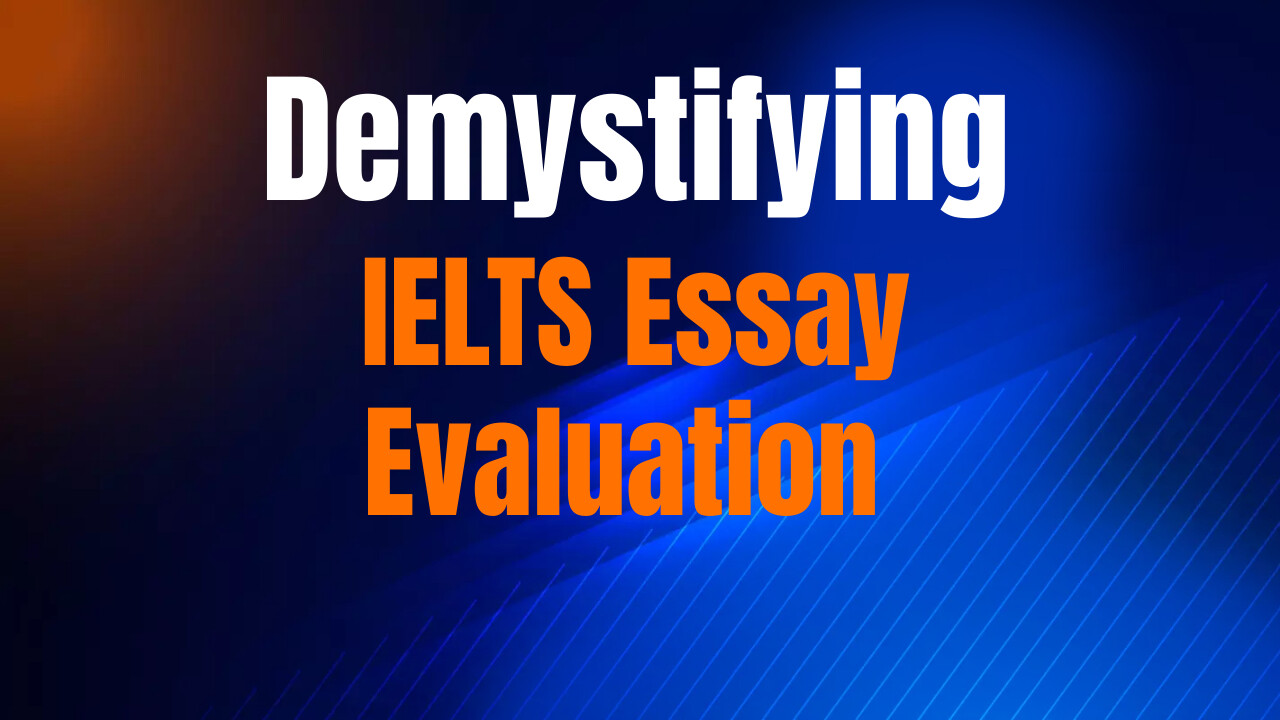8I IELTS Success Stories R Cleared GT Exam 8777 requirements...
Read More
Demystifying IELTS Essay Evaluation: Your Path to Writing Excellence
The IELTS essay is a critical component of the writing section, demanding precision in language use, structure, and argumentation. To understand your strengths and areas for improvement, IELTS essay evaluation plays a pivotal role. In this blog post, we'll delve into the world of IELTS essay evaluation, exploring its significance, the evaluation process, and how it can guide you toward achieving your desired band score.
Understanding IELTS Essay Evaluation
IELTS essay evaluation involves a meticulous assessment of your essay by experienced evaluators. Its purpose goes beyond pointing out errors; it offers insights into your writing strengths and areas that need refinement. This process is particularly helpful for candidates seeking to enhance their writing skills and boost their band score.
The Evaluation Process
1. Grammar and Vocabulary:
Evaluators scrutinize your essay for grammatical accuracy and a diverse vocabulary. This includes sentence structure, word choice, and proper usage of tenses.
2. Coherence and Cohesion:
The flow of ideas is crucial in an essay. Evaluators assess how well your paragraphs are connected, the use of linking words, and the overall coherence of your essay.
3. Task Fulfillment:
Evaluators ensure that your essay addresses all aspects of the given task prompt. This criterion is essential for demonstrating your ability to comprehend and respond effectively to the task.
4. Argumentation and Organization:
Your essay's argument should be logical and well-structured. Evaluators look at the development of your ideas, the clarity of your thesis statement, and the organization of your supporting points.
5.Introduction and Conclusion:
The introduction should grab the reader's attention and present your main argument, while the conclusion should summarize your points and provide a final perspective.
We have a dedicated IELTS Essay Correction Service. Check it Now!
The Benefits of IELTS Essay Evaluation
1. Identifying Strengths:
Evaluation highlights your writing strengths, allowing you to build upon them. Recognizing what you do well is just as crucial as addressing areas for improvement.
2. Targeted Improvement:
Detailed feedback provides actionable insights into your weaknesses. You can focus your practice on specific aspects, such as grammar, coherence, or vocabulary.
3. Learning from Mistakes:
Errors are stepping stones to improvement. IELTS essay evaluation shows you where you've gone wrong, enabling you to learn from your mistakes.
4. Benchmarking Progress:
Regular evaluation allows you to track your progress over time. As you refine your skills, you can see your writing evolve and become more sophisticated.
Making the Most of Evaluation Feedback
Read Thoroughly:
Carefully review the evaluator's comments, suggestions, and corrections. Understand the reasons behind each recommendation.
Practice and Apply:
Apply the feedback in your subsequent writing practice. Focus on rectifying the identified weaknesses and incorporating the suggested improvements.
Experiment with New Techniques:
Experiment with new vocabulary, sentence structures, and organization techniques based on the evaluator's suggestions.
In Conclusion
IELTS essay evaluation is not just a score but a pathway to writing excellence. Through meticulous assessment, personalized feedback, and insights into your writing style, it offers a comprehensive guide to improving your writing skills. Embrace evaluation as a tool to enhance your strengths, address your weaknesses, and work your way toward achieving a higher band score. With dedication and the right guidance, you can transform your essay writing from good to exceptional, making your IELTS journey an accomplishment to be proud of.

Get Your Writing Tasks Evaluated by an IELTS Expert
- Follow us on
Our Blog
- All about IELTS (Tips & Strategies) (16)
- IELTS Speaking (12)
- Recent Success Stories (24)
- Uncategorized (4)
- Writing Task 1 Model Answers (1)
- Writing Task 1(GT Letters) (38)
- GT Band 6 samples (1)
- GT Band 7 letters (10)
- Writing Task 2 Model Answers (59)
- Band 6 Samples (1)
- Band 6.5 Samples (4)
- Band 7 samples (10)
- Our Success Stories
Another IELTS Success Story
22I IELTS Success Stories Khyati, our student scored 7.5 Bands...
Read More- DON'T MISS
5 Must-Have Features of an Effective IELTS Writing Checker
5 Must-Have Features of an Effective IELTS Writing Checker The...
Read MoreMastering IELTS Writing: How an IELTS Writing Checker Can Boost Your Band Score
Mastering IELTS Writing: How an IELTS Writing Checker Can Boost...
Read MoreOur Services
{"title":"","show_title":"0","post_type":"product","taxonomy":"","term":"0","post_ids":"3541,1313,2395,1306","course_style":"rated","featured_style":"generic","masonry":"","grid_columns":"clear4 col-md-3","column_width":"268","gutter":"30","grid_number":"4","infinite":"","pagination":"","grid_excerpt_length":"100","grid_link":"1","grid_search":"0","course_type":"","css_class":"","container_css":"","custom_css":""}





